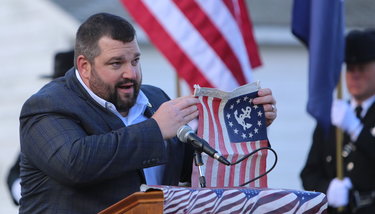Westerlo establishes capital reserve fund, first step in larger improvement plan
WESTERLO — At its first regular meeting of the year, the Westerlo Town Board voted unanimously to establish a $1.2 million capital reserve fund, which will be used on various improvements in the town over the next four years, according to a spending plan that has yet to be adopted.
Supervisor Matt Kryzak told The Enterprise this week that he hopes seeing this plan through will be his primary accomplishment as supervisor, after which he’ll “ride off into the sunset and let someone else take the helm, with the town being in a way better position than when I inherited it.”
Kryzak was re-elected to his first four-year term as supervisor in November after taking over the position in 2021, when former Supervisor Bill Bichteman, a Democrat, resigned in the middle of his term. Kryzak, a Republican, had to run later that year to finish out Bichteman’s term.
Kryzak said being supervisor is “not an enjoyable job,” and that he’s doing it “because I want to see things done right.”
With a background in business, Kryzak said he recognizes that financial planning should be done well in advance, rather than year-by-year.
The draft of Kryzak’s plan allocates the money to 18 separate projects, most related to building improvements. However, nearly half of the fund would go toward just two items: a new plow for the highway department, at $350,000; and a renovation of the transfer station, for $225,000.
“We have an excellent transfer station. We just want to reinvent how it’s set up,” Kryzak said. “We want to put a lot more of the containers under cover in one location, so we want to have … basically a three-sided building where people can walk into that building and there’s different containers” for various types of refuse.
The point, he said, is to make it easier for people to appropriately sort the material and “divert it away from landfills.”
Westerlo, like many other municipalities, sends waste to the Rapp Road landfill, which is nearing capacity and is scheduled to shut down in 2028, though officials have said that it could have a longer life if the proper waste-reduction strategies are used.
When it closes, though, Kryzak said the town won’t “get those bargain-basement tipping fees that we’ve all been spoiled by” with the landfill “right down the road.”
“We’re kind of training people now to help save on that in the future,” he said.
The other projects, all between $25,000 and $85,000, focus on the town hall, justice court, and highway garage, along with $25,000 dedicated to the library.
Kryzak said he hopes that the town can eventually build all new buildings, particularly for the court, which he thinks should be a stand-alone structure for security reasons, but the existing buildings “need a lot of work,” and need to be preserved until the town is ready for that kind of project.
“The buildings are very important because they’re owned by the taxpayer, and I want the taxpayers to own an asset, not a liability,” he said, explaining later that new buildings should be planned thoughtfully, so that they can continue to meet needs and standards for “not 5 years, not 50 years … but 100 years.”
“‘Buy once, cry once’ is my favorite saying,” Kryzak said.
The added benefit of the reserve fund, he said, is that it shows the state comptroller that the town isn’t simply hoarding the massive $2.4 million fund balance that he helped build up as supervisor.
Kryzak said that he often reaches out to the comptroller’s office for guidance on structuring the accounts so that “everybody understands we’re not just saving for a rainy day, we’re saving for specific items that need to be replaced, repaired, updated, things of that nature,” while ensuring enough is left over for sudden emergencies.
Acknowledging some of the tensions that had built up ahead of last November’s election, where he had two challengers for the supervisor’s position, Kryzak said, “People might say I’m gruff, or this or that, but it’s not that. I’m really trying to be cut and dry about what we need financially.”
The establishment of the reserve fund is subject to permissive referendum, meaning the public can petition to put the issue to a town-wide vote, but Kryzak said he thinks people are in agreement on the need for a long-term plan.
“It’s common sense that, if you want to make things better, the money has to come from somewhere … Anybody who’s financially healthy and financially savvy knows you don’t just wake up and say, ‘I’m going to do this — I don’t have the resources but I’ll do it anyway,’” he said. “Everyone knows in order to be successful you need to have a plan and work to that plan.”


